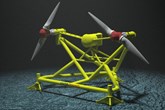RWE builds BESS to help safeguard Dutch grid
Published by Jessica Casey,
Editor
Energy Global,
RWE is expanding its battery storage business with an innovative technology for grid stability. The company has begun construction of an ultra-fast battery storage system with an installed capacity of 7.5 MW and a storage capacity of 11 MWh on the site of its power plant in Moerdijk, in the Netherlands.
With its ability to provide or absorb electricity within milliseconds, the system will help to safeguard the electricity grid. This function is called inertia.
The Moerdijk battery storage project is part of the system integration solutions for OranjeWind, the Dutch offshore wind project by RWE and TotalEnergies. OranjeWind is to establish new ways to integrate intermittent renewable energy generation into the Dutch energy system through electrolysers, smart charging stations for electric vehicles, e-boilers, and battery storage systems.
Marinus Tabak, COO of RWE Generation and RWE Country Chair for the Netherlands, said: “With the Moerdijk battery storage system, we are pioneering grid-forming technologies as alternatives to traditional solutions such as power stations. This offers a pathway to a more sustainable yet reliable energy future. Battery storage systems like this will be crucial for the stability of electricity grids in the future as Europe’s energy market is moving towards renewable energy and decentralised energy systems.”
Maintaining grid stability is becoming harder as the share of renewables in the energy system increases. The role of inertia as the fastest available balancing energy in the grid system is therefore crucial. In the past, inertia has been primarily provided by rotating masses of conventional power generators, e.g. in coal-fired power plants. As renewables substitute conventional generation plants, the number of rotating generators decreases. Battery storage systems can compensate for this loss of synchronous inertia in the grid.
For the battery storage system, RWE is installing lithium iron phosphate (LFP) batteries in three shipping containers on the site of its Moerdijk power plant. The storage system will be connected to the high-voltage grid via the existing grid connection. Highly reactive control technology and inverters with grid-forming functionality enable the battery storage system to provide instantaneous reserve power. The grid-forming property here refers to the ability of systems to take over important functions traditionally performed by conventional power plants to ensure a stable and reliable electricity grid.
After commissioning at the end of 2024, the plant will undergo a two-year pilot phase. During this phase, the transmission system operator TenneT will be a partner of the project to further develop its technical requirements and grid compliance procedures for the grid-forming features of the battery storage system.
For more news and technical articles from the global renewable industry, read the latest issue of Energy Global magazine.
Energy Global's Summer 2024 issue
The Summer 2024 issue of Energy Global starts with a guest comment from Terrawatt on the streamlining of the permitting process in Italy, before moving on to a regional report from Frost & Sullivan on the energy landscape in Asia Pacific. This issue looks at key topics such as wind installation vessels, offshore wind turbine foundations, weather analysis, solar maintenance, and more!
Read the article online at: https://www.energyglobal.com/energy-storage/09092024/rwe-builds-bess-to-help-safeguard-dutch-grid/
You might also like
HydroWing awarded additional 10 MW
HydroWing Tidal Energy Projects has been awarded a further 10 MW for its Ynni’r Lleuad project in Wales in the UK government’s AR7a Contracts for Difference awards.

